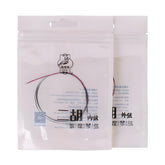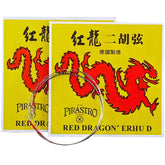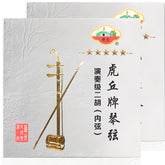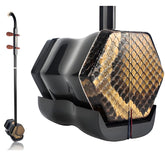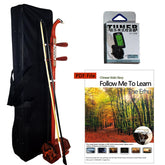What Erhu Should I Buy?
What Erhu Should I Buy?
Let’s Talk in Detail.
When choosing an erhu, it’s important to understand the different types of wood, snakeskin quality, craftsmanship, and brands. These factors can significantly affect the sound, playability, and longevity of your instrument.
1. Wood Types and Grades
Erhus are made from various types of wood, including rosewood, red sandalwood, ebony, and aged purple sandalwood. Each wood type has its own tonal character, and within each type, there are also different quality grades. For example, old, dense, well-aged rosewood sounds better and costs more than newer, less mature cuts.
2. Snakeskin Quality
The snakeskin—typically genuine python—is one of the most crucial parts of an erhu, directly affecting its tone. In the Chinese market, only top-tier brands have long-standing relationships with certified python skin suppliers, which allows them to handpick the best parts of each skin. Brands like Huqiu, Dunhuang, YueHai, Lu Linsheng, and Wan Qixing are well known for securing the finest skins.
From one whole snakeskin, only 3 to 4 small central sections are suitable for high-quality erhus. The remaining edge pieces are often sold to small workshops, resulting in instruments with lower tonal consistency. Simply put, top brands aim for quality, while smaller factories often prioritize quantity.
3. Craftsmanship
Respected erhu brands bring together master luthiers with decades of experience and traditional techniques passed down through generations. Their instruments are precise, reliable, and artistically crafted. For instance, Huqiu, China’s No.1 erhu manufacturer, once said:
“If you can’t produce a beautiful sound with a Huqiu erhu, the problem isn’t the instrument—it’s your technique.”
This speaks to the brand’s confidence in its craftsmanship.
4. How to Choose Based on Your Needs
-
For Beginners:
If you're just starting out and unsure whether you'll stick with the instrument long-term, you might consider a more budget-friendly option. In this case, brand isn't everything—affordability and playability are more important at the early stage. -
For Committed Learners:
If you're confident in your musical journey and willing to invest in a better instrument, consider mid-range models from trusted brands like Huqiu, Lu Linsheng, or Wan Qixing. These instruments offer noticeable upgrades in tone, feel, and craftsmanship.
5. Balancing Budget and Quality
It's true that premium brands come with a price premium. But you're paying for more than just a name—you’re paying for superior materials, refined craftsmanship, and long-term reliability. If your budget allows, a good erhu is an investment worth making.
In short: Your ideal erhu depends on your skill level, commitment, and budget. Choose wisely, and may you find the perfect erhu that inspires you to keep playing!

